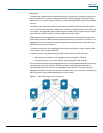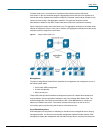
Design Guide
© 2008 Cisco Systems, Inc. All rights reserved. This document is Cisco Public Information. Page 23 of 28
This design supports traffic monitoring using SPAN or RSPAN. For example, a network-analysis
device connected to the external ports on the front of the Cisco Catalyst Blade Switch 3020 may
capture locally mirrored traffic. Alternatively, RSPAN traffic can be carried on the Cisco Catalyst
Blade Switch 3020 uplinks if bandwidth usage is not a concern. For the steps to configure traffic
monitoring, refer to the “Configuration Details” section.
Configuring the Aggregate Switches
Complete the following steps on the aggregate switches:
Step 1. VLAN configuration
Step 2. RPVST+ configuration
Step 3. Primary and secondary root configuration
Step 4. Configuration of port channels between aggregate switches
Step 5. Configuration of port channels between aggregate switches and Cisco Catalyst Blade
Switch 3020s
Step 6. Trunking of port channels between aggregate switches
Step 7. Configuration of default gateway for each VLAN
Configuring the Cisco Catalyst Blade Switch 3020s
Complete the following steps on the Cisco Catalyst Blade Switch 3020s:
Step 1. VLAN configuration
Step 2. RPVST+ configuration
Step 3. Configuration of port channels between the Cisco Catalyst Blade Switch 3020s and
aggregate switches
Step 4. Trunking of port channels between the Cisco Catalyst Blade Switch 3020 and aggregate
switches
Step 5. Configuration of server ports on the Cisco Catalyst Blade Switch 3020
Configuration Details
This section describes the configuration steps required for implementing the topologies discussed
in this guide. It discusses configurations for the following:
●
VLAN
●
RPVST+
●
Inter-Switch Link (ISL)
●
Server port
●
Server default gateway
●
RSPAN


















